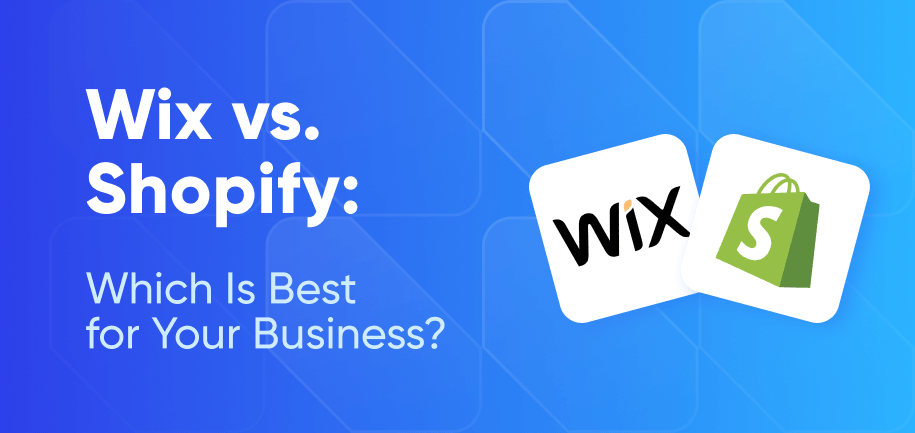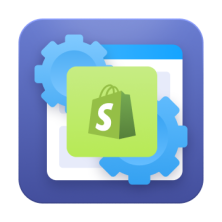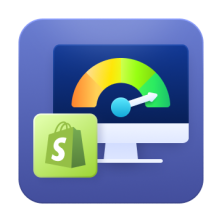E-commerce has revolutionized the way we do business. While this has been a great win for convenience and speed, it has also increased users' expectations of things such as customer service, returns, web page loading times, sales, and the overall aesthetic of the site itself.
There are so many great e-commerce options. Which one should you choose?
Join us as we explore Shopify vs Squarespace, a showdown that will have all of your questions answered. We will compare Shopify and Squarespace, both titans of the industry, to find similarities and differences in things like pricing, marketing, design, and security.
What is Shopify?
Shopify needs no introduction. It is one of the world's largest dedicated e-commerce platforms built to empower online businesses. Shopify has many features that handle everything from product listings and inventory management to secure payment processing and marketing automation.
Let's take a look at some of the features below as we compare Squarespace vs Shopify for e-commerce.
Key Features and Benefits
- Intuitive Interface – Shopify's user-friendly interface makes navigating easy, even for those with limited technical experience. Shopify website development can be as simple or elegant as you'd like
- Scalability – Shopify can handle businesses of all sizes, from small startups to established brands. It scales well as your business grows, and you can use all features fully.
- App Store – With thousands of apps in the Shopify App Store, you can extend your store's functionality and tailor it to your specific needs. There's an app for (almost) everything, both free and premium, to help with sales, marketing, automation, and store layout.
- Security – Shopify takes user security seriously. It prioritizes being onside and compliant, offering PCI compliance and SSL certificates to ensure safe and secure transactions.
- Mobile-Friendly – Shopify stores are inherently responsive and optimized for mobile browsing, catering to the growing mobile-first shopping trend.

Pricing Plans and Affordability
Shopify offers several pricing tiers, the key ones being:
- Basic ($39/month). Designed for starting a dedicated store, it offers fundamental features like unlimited product listings and abandoned cart recovery.
- Shopify ($79/month). Provides advanced features, including discounted transaction fees and gift cards, so you can increase your loyalty programs and match the features of the giants.
- Shopify Plus ($299/month). An elite plan that is highly customizable. It offers B2B functionality, headless commerce, and more.
Read More: A Full Guide to Shopify Pricing
Pros
- Very scalable and future-proofs your business to match or stay ahead of trends
- Extensive app ecosystem for customization and optimization
- Dedicated e-commerce features to grow your e-commerce empire
- User-friendly interface that will have your customers coming back for more
- Wide range of integrations for marketing, analytics, and real-time data
Cons
- Higher starting price in the Shopify versus Squarespace question
- Basic design options require custom themes or apps for advanced customization
- The app store can get overwhelming if you are trying to get too complex too quickly
What is Squarespace?
Squarespace started as a website builder, but they've expanded into e-commerce territory. While it offers e-commerce functionality, it's not as feature-rich as Shopify.
Squarespace is ideal for businesses that focus on visual appeal and storytelling. It offers a user-friendly interface and beautiful design templates. While it is not known for its e-commerce functionalities, it continues to grow in that space to cater to a broader range of customers and users.
Key Features and Benefits
- Stunning and Pleasing Templates – Squarespace is known for its visually striking and professionally designed templates, perfect for creating a beautiful online store with minimal design experience.
- Easy to Use – Squarespace's drag-and-drop interface is incredibly user-friendly for beginners.
- Integrated Blogging – If storytelling and content marketing are critical to your brand, Squarespace's built-in blogging platform is a convenient feature, which is not shared by Shopify's native platform.
- Social Media Integration – Squarespace allows you to easily integrate your social media channels with your store, promoting products and driving traffic while also giving you full advantages as an influencer.

Pricing Plans and Affordability:
Squarespace pricing vs Shopify is favorable in terms of cost, but may not be suitable for your goals. Take a look at their four main plans:
- Personal ($16/month). Ideal for personal websites, not e-commerce. This is great for solopreneurs or those making a name for themselves.
- Business ($26/month). Enables basic e-commerce functionality with limited features, so you can test your product line before making a large investment.
- Commerce ($40/month). Provides more advanced e-commerce tools, including abandoned cart recovery and inventory management, so you can run your store properly.
- Advanced Commerce ($46/month). Offers advanced features like subscriptions and real-time shipping rates so that you can enable recurring and bulk orders.
Pros
- User-friendly interface with simple drag-and-drop functionality and no coding required
- Beautiful and customizable design templates that offer a sleek and elegant look
- An integrated blogging platform for content marketing, making brick-and-mortar integration a cinch.
- Built-in social media integration so you can seamlessly post across all channels and socials.
Cons
- A Squarespace shop vs Shopify has limited e-commerce features in comparison.
- Less scalable for high-volume businesses without custom solutions
- The available apps have fewer integrations and cannot give you the same breadth of options
Side-by-Side: Squarespace or Shopify for Small Business
Feature | Shopify | Squarespace |
|---|---|---|
Design Flexibility | High – customizable themes and app integrations | High – beautiful pre-designed templates but limited customization for e-commerce |
Product Management | Strong – unlimited product listings, variants, and inventory management | Moderate – limited product variants and inventory management options |
Payment Processing | Supports various payment gateways including Stripe and PayPal | Supports major payment gateways like Stripe and PayPal |
Security | PCI-compliant and secure transaction processing | PCI-compliant but limited security features compared to Shopify |
Marketing & SEO | Built-in SEO tools, email marketing, social media integration, and abandoned cart recovery | Basic SEO tools, email campaigns, and social media integration, but less comprehensive |
Customer Support | 24/7 customer support via email, phone, and live chat | Good customer support options, including email and live chat |
Community & Resources | A large and active user community, extensive knowledge base, and webinars | A smaller community but growing, with helpful resources and tutorials |
Which is Better Shopify or Squarespace?
Shopify is the clear winner when it comes to product management and customization. You can list as many products as you want, manage different variations with ease, and even integrate countless apps to supercharge your store. Plus, Shopify offers robust marketing tools and top-notch customer support.
For example, Shopify wins if you want a dedicated online store with multiple functionalities and customized support for multichannel distribution.
Squarespace shines in the design department, offering stunning templates that are easy to customize. While it's great for smaller businesses with more straightforward product offerings, it might fall short when you need advanced features or want to scale your store.
For example, Squarespace is the clear winner if the dilemma is Squarespace vs Shopify for artists, freelancers, and solopreneurs.
Should I Use Shopify or Squarespace?
The difference between Shopify and Squarespace is your end goal. Generally, aesthetically pleasing small businesses with e-commerce as a side revenue vertical should choose Squarespace. The Shopify website vs Squarespace is more conducive to large online retailers, both with B2C and B2B distribution.
Examples of Businesses Using Shopify
Shopify's versatility has attracted businesses of all sizes and industries. Here are a few notable examples:
- Gymshark. A fitness apparel giant, Gymshark relies on Shopify to power its high-traffic online store.
- Ruggable. A store with an innovative concept of washable rugs, transforming how people think about and maintain their living spaces.
- Kylie Cosmetics. A beauty brand founded by Kylie Jenner, offering a wide range of cosmetics, including lip kits, eyeshadows, and more.
Read More: 50 Best Shopify Stores
Examples of Businesses Using Squarespace
Squarespace's design-focused approach has appealed to businesses with a solid visual identity. Some famous examples include:
- Fjällräven. The American branch of the Swedish outdoor equipment company, known for its iconic backpacks and outdoor clothing.
- Beardbrand. A grooming company specializing in products for beard care, hair, and skin, aimed at helping men feel their best.
- Brown Eyed Baker. This bakery showcases its delicious treats with visually appealing product photography on Squarespace.
Making Your Decision and Looking Forward
Your due diligence has just begun with this comprehensive guide, which contains everything you need to compare and contrast. The answer? It depends on your unique needs. Squarespace might be your ideal starting point if you're a budding entrepreneur with a keen eye for design and a smaller product line. Its user-friendly interface and beautiful templates make it easy to create a stunning, mobile-responsive online store.
However, if you want to build a scalable e-commerce empire with a broader range of products and advanced features, Shopify is the clear winner. Its diverse and dedicated platform, extensive app ecosystem, and focus on e-commerce make it a powerful tool for businesses of all sizes.
Ultimately, the best way to decide is to weigh your options carefully. Consider your budget, technical expertise, and long-term goals. And remember, the perfect platform helps you to sell more, grow faster, align with your brand, and delight your customers.

















